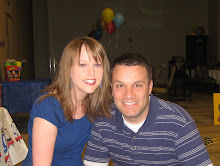As many of you are aware, the Transplant Team is starting the process for another transplant. Several weeks ago, Mark and I visited the Transplant Team for his follow-up appointment. We spent a great deal of time talking with the Surgeon regarding what went wrong during the first transplant and what the team will do differently if another transplant is conducted. Many of our family and friends have asked the same types of questions about our situation and follow-up visit with the Transplant Team. So, in an effort to make this information easier to read, I've listed the information in a question and answer format. Enjoy!
What happened to my kidney after it was removed from Mark's body?
It was sent to pathology for testing. The testing was completed to determine why the transplant failed.
What were the results of the testing? Did the testing indicate what happened?
Results from pathology regarding my kidney were somewhat inconclusive in the sense that they could not conclude if the failed transplant was a true case of rejection or if some other factor caused the transplant to be unsuccessful. A great deal of the blood vessels in the kidney appeared clotted. The physicians don't know if the clotting issue occurred as a result of 1. Mark's body clotting in response to my kidney; 2. Mark having some rare genetic type of clotting disorder (he has family history of this); 3. My kidney might have had a clot that was unable to be detected during the evaluation process or removed during the part of the transplant where they "cleanse" the kidney after removing it from the donor; or 4. a combination of these factors.
What will the Transplant Team do differently during the next transplant?
Regardless of what caused the clotting issue, the Transplant Team is going to use anti coagulation medication (i.e. "blood thinners") before and after the transplant. This is very risky though-I don't think any doctor would choose for a patient to be on blood thinners during a major surgery.
Why didn't the physicians use anti coagulation medication during the first transplant?
The risk involved with the blood thinning medication is the reason why it wasn't used during the first transplant. The team had no reason to believe an issue with clotting existed. Now that they know about the clotting issue, I guess they are willing to accept the risk.
Is Mark on the "waiting list" for a kidney from a cadaver?
Yes, Mark has been placed on the universal network for organ sharing list. As I mentioned in a post from several months ago, we were under the impression that he was already on the list. Apparently, when I was completing the testing to become the donor, Mark was not on the waiting list. However, we received an official letter a few weeks ago stating he was on the list. Hypothetically, we could get a phone call at any time telling us that Mark has been selected as the recipient from the waiting list. However, the average wait time on the list is around 15 months. We are praying for another transplant sometime soon-before Mark is in need of dialysis.
Who is the next potential living donor?
If you recall, Mark has had about 14 people call the Transplant Clinic and offer to become his donor. Back in December, the top three donors completed the blood crossmatch test. All three (Mark's Aunt Carma, Justin White, and me) passed the test. When the transplant with my kidney was deemed unsuccessful, the Transplant Team wanted to explore completing another living donor transplant. When Mark was still hospitalized from the first transplant, Justin, the son of one of Mark's coworkers, called and came to visit him at UK to let him know he was still willing to give his kidney. So, the living donor evaluation process has started with Justin. As I've noted in previous posts, Justin's willingness to help Mark is truly amazing. It honestly blows my mind. Justin is a Freshman in college. How many 18 year olds are willing to become a living kidney donor-especially to someone who is not considered a "close friend or family member"? Mark and I have both told Justin that he can change his mind at any time and we would not blame him or be upset. We would never want him to feel pressured to make this decision. Each time we speak with Justin, he seems determined to help. He told me not long ago that he "really wanted to do this." Just thinking about Justin's willingness to help brings me to tears. The Lord truly does work in mysterious ways. Even if something happens where it is not in God's plan for Justin to become Mark's donor, I can honestly say that we have already been blessed by knowing Justin.
When will the next transplant take place?
The transplant is tentatively scheduled for the last Wednesday in June or first Wednesday in July. Please understand that this is only an approximation. The Transplant Team feels it is best if Mark's body has time to rid itself of the anti-rejection medication that was used during the first transplant as this type of medication weakens the immune system and may make another surgery difficult.
What will happen between now and the next transplant?
Mark is being followed by the Nephrology practice that has cared for him since he was first diagnosed with IGA. These physicians will monitor his kidney function and determine if and when he will need dialysis. Justin will continue with the living donor evaluation process. A second crossmatch test with Justin and Mark's blood has been scheduled for May 7th. I will see a Hematologist at UK on May 6th who will do some analysis of my blood to make sure I don't have a blood clotting disorder.
Sunday, April 19, 2009
Subscribe to:
Comments (Atom)
